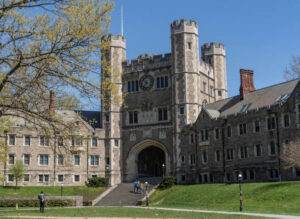Introduction
Nestled in the charming town of Princeton, New Jersey, Princeton University has been a beacon of learning since its establishment in 1746 as the College of New Jersey. Over the years, it has grown into a distinguished Ivy League institution, celebrated globally for its commitment to scholarship, innovative research, and the holistic development of its students.

Campus and Architectural Splendor
Spread across more than 500 acres, Princeton’s campus is a blend of timeless architecture and modern academic life. The historic Nassau Hall, the university’s oldest building, stands proudly, weaving the history of Princeton into its walls.
The campus, adorned with picturesque lawns and majestic buildings, houses cutting-edge facilities, including the renowned Firestone Library with its vast collection of scholarly works. The Princeton University Art Museum adds a cultural touch, offering a curated experience for both students and visitors.
Academic Excellence
Princeton’s dedication to academic excellence is evident in its diverse range of undergraduate and graduate programs. Home to esteemed academic units such as the Woodrow Wilson School of Public and International Affairs, the School of Engineering and Applied Science, and the School of Architecture, the university encourages interdisciplinary exploration and groundbreaking research.
The faculty, composed of experts in their fields, creates a unique learning experience, providing students with invaluable insights. The university’s commitment to research is showcased through projects at the Princeton Plasma Physics Laboratory and the Institute for Advanced Study, contributing significantly to global scientific advancements.
Student-Centric Environment
Princeton University takes pride in fostering a close-knit and inclusive community. The residential college system promotes strong interpersonal connections, allowing students to collaborate, challenge each other, and form lasting friendships.
Beyond academics, Princeton’s vibrant extracurricular scene offers a plethora of student clubs and organizations. Whether participating in athletics as part of the Princeton Tigers or engaging in cultural pursuits, students are encouraged to explore and develop their passions beyond the classroom.
Admissions and Financial Accessibility
Admission to Princeton is competitive, with the university employing a holistic approach to evaluate applicants based on academic achievements, extracurricular involvement, and personal qualities. Demonstrating its commitment to accessibility, Princeton’s financial aid program ensures that admitted students have their full demonstrated financial need met, fostering a diverse and inclusive community.
Notable Alumni Legacy
Princeton University boasts a remarkable alumni network, including influential figures such as U.S. Presidents James Madison and Woodrow Wilson, mathematician John Nash, author F. Scott Fitzgerald, and Supreme Court Justice Sonia Sotomayor. These alumni embody the transformative power of a Princeton education in shaping leaders and visionaries.
Certainly! Here are some frequently asked questions (FAQs) about Princeton University:
General Information:
Q1: When was Princeton University founded?
A: Princeton University was founded in 1746 as the College of New Jersey.
Q2: Where is Princeton University located?
A: Princeton University is located in Princeton, New Jersey, USA.
Q3: Is Princeton a private or public university?
A: Princeton University is a private Ivy League institution.
Academics:
Q4: What undergraduate and graduate programs does Princeton offer?
A: Princeton offers a wide range of undergraduate and graduate programs across various disciplines, including humanities, social sciences, natural sciences, and engineering.
Q5: How competitive is the admissions process at Princeton?
A: Admissions at Princeton are highly competitive, with a holistic review process considering academic achievements, extracurricular activities, and personal qualities.
Q6: What is the student-to-faculty ratio at Princeton?
A: The student-to-faculty ratio at Princeton is relatively low, fostering close interactions between students and faculty.
Campus Life:
Q7: Does Princeton have a residential college system?
A: Yes, Princeton has a residential college system, contributing to a close-knit community and strong interpersonal connections among students.
Q8: What extracurricular activities are available for students?
A: Princeton offers a diverse range of extracurricular activities, including student clubs, organizations, and athletic pursuits as part of the Princeton Tigers.
Q9: How is the campus environment at Princeton?
A: The campus at Princeton is known for its picturesque beauty, Gothic architecture, and vibrant academic atmosphere.
Financial Aid:
Q10: Does Princeton University offer financial aid?
A: Yes, Princeton University is committed to meeting the full demonstrated financial need of admitted students through its financial aid program.
Q11: Is financial aid available for international students?
A: Yes, Princeton University provides financial aid to eligible international students, ensuring inclusivity.
Alumni:
Q12: Who are some notable alumni of Princeton University?
A: Princeton’s alumni include figures such as U.S. Presidents James Madison and Woodrow Wilson, mathematician John Nash, and Supreme Court Justice Sonia Sotomayor.
Q13: How does Princeton support its alumni network?
A: Princeton University supports its alumni through various networking events, mentorship programs, and continued engagement opportunities.
Stay Updated:
Q14: How can I stay updated on the latest information about Princeton University?
A: For the most up-to-date information, it is recommended to visit Princeton University’s official website or follow their official social media channels.
These FAQs provide a general overview, and for specific details, it is advisable to check the university’s official resources or contact their admissions and information offices.
Conclusion
Princeton University, with its rich history and commitment to academic excellence, stands as a nurturing hub for intellectual growth. As it continues to evolve and adapt to the changing educational landscape, Princeton remains a place where students are inspired and equipped to tackle the challenges of the world with intellect, creativity, and a spirit of service. For the most up-to-date details, interested individuals are encouraged to explore Princeton University’s official channels.
